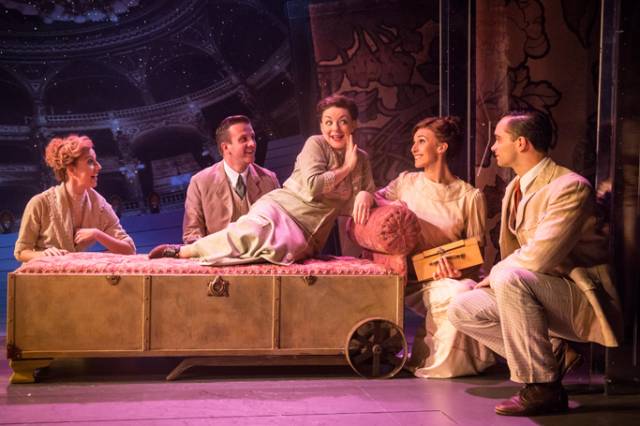

Traveling to Britain in winter months is an economical way to experience the varied pleasures of London theatre, especially if you purchase your flight and lodging months in advance. Earlier this month I spent a week in London, checking in on a range of plays and musicals. The weather was actually temperate, by the way, with some trees already in full blossom (being on holiday, I smiled and tried not to think about climate change).
Anyway, here are some of my notes on the trip:
Developed in part at New York Theatre Workshop, Close to You: Bacharach Reimagined (Criterion Theatre) gives the Burt Bacharach song catalogue a 21st-century spin.
Very much the center of this concert/revue program is co-conceiver, arranger, musical director and performer Kyle Riabko, whose vocals dominate throughout the two-act program. The rest of the seven-person ensemble does some effective work, though Canadian-born Riabko’s fellow male performers get limited opportunities in the spotlight.
It’s refreshing to hear the composer’s classic melodies (most with lyrics by Hal David) restyled for an audience that wasn’t around during the songs’ heyday. Riabko and Co. “smash up” multiple songs into a series of extended numbers, with the main hook from one tune serving as the bridge of another, or vice versa. The opening phrase of “Alfie,” is quoted in several of these mega-medleys (the original title of the show, in fact, was What’s It All About?). At a certain point, this melodic scrambling grows a bit wearisome. When, near the end, Riabko finally sings a simple, plaintive rendition of “Alfie,” it comes as something of a relief.
The Picture of Dorian Gray (Trafalgar 2 Studios) is a new adaptation of Oscar Wilde’s sole novel, published in 1890. Producer John O’Connor, along with Merlin Holland (Wilde’s only grandchild), have fitted the familiar story to the stage.
The production stars Guy Warren-Thomas as Dorian. He’s joined by three other actors, playing an array of characters: young and old, male and female. Director Peter Caaze’s direction on Trafalgar 2’s small stage is relatively simple, but it is also emotionally charged. Wilde’s tragicomic sensibility follows the story to its melodramatic conclusion, and the novel’s homoerotic notes are strongly accentuated. This Dorian Gray is a well-told tale—and a haunting one.

Such American musicals as West Side Story and Fiddler on the Roof have dealt in one way or another with the advantages and drawbacks of cultural assimilation. Now Britain’s Bend It Like Beckham: The Musical (Phoenix Theatre) follows suit. Based on director Gurinder Chadha’s 2002 film, it’s the tale of Jesminder (“Jess”) Bharma, a soccer-happy teenage girl from an Indian immigrant family living in Southall, London in 2001. The show (directed and co-written by Chadha) has been kicking at the Phoenix since May of last year.
The prologue, set at a Southall shopping mall, gets the proceedings off to a low-key start. But then the sparkling ensemble of soccer players welcomes fellow athlete Jess onto their turf—singing the sprightly and irresistible “Girl Perfect”—and Bend It Like Beckham is off and running.
Howard Goodall and Charles Hart’s score is hit-and-miss, but the best songs embrace a poppy new-millennium sound with pleasing South Asian embellishments. Sometimes Chadha and Paul Mayeda Burges’s libretto is a bit heavy handed in the way it shows Jess striving to balance her personal bliss with her familial duty. Still, the proceedings are good-humored throughout, and frequently touching.
The big set change in the National Theatre’s modern-dress staging of Shakespeare’s As You Like It creates an indelible memory for theatergoers. The urban “court” scenes early in the play are set in a robotically frantic office complex. Then, as the action moves to the Forest of Arden, every stick of furniture is hoisted loft-ward, creating a massive tangle of Ikea-style limbs and branches overhead. (Unfortunately, on the night I saw the show, something went awry during the process, and the proceedings were halted for several moments while things were set right.)
Director Polly Findlay’s ambitious staging includes many bold strokes. At one point, for instance, most cast members impersonate a flock of baa-ing sheep, wearing woolen sweaters and ambling about the stage on hands and knees.
As You Like It has much to like. It is rich with sweet rustic-sounding music by Orlando Gough. Rosalie Craig makes a lyrical Rosalind. And Paul Chahidi takes on an especially comedic approach to the philosophical and melancholy Jaques (though his “Ages of Man” speech is nonetheless heartfelt and affecting). This show is a bit messy in places, but I found it captivating.

An adaptation (by David Wood) of Michelle Magorian’s 1981 children’s book, Goodnight Mister Tom (Duke of York’s Theatre) is set at the onset of World War II, when children of London were spirited out of the city to remote villages where they would likely be safer. The maneuver was known as Operation Pied Piper.
At the matinee performance I attended, groups of schoolchildren comprised a large share of the audience. They quickly became absorbed in the story of young William Beech, the son of a fanatically religious single mother. “Willy” (played at each performance by one of three young actors) winds up in a remote village at the home of Tom Oakley (David Troughton), a crusty, reclusive widower.
You can’t ask for a more quintessentially British theatrical experience than Goodnight Mister Tom, which is an object lesson in the importance of patriotism and pluck. Heartstrings are strummed vigorously by Magorian, Wood, and director Angus Jackson. Once “I’ll Be Seeing You” is sung, you know it’s only a matter of time before someone will offer up strains of “The White Cliffs of Dover.” Yet the play doesn’t feel emotionally manipulative. Its characterizations seem honest and its storytelling vibrant.
French playwright Florian Zeller is something of a sensation in Britain these days. His The Mother (translated by Christopher Hampton) has been enjoying a run at the Tricycle. Another of his plays, The Father (which played to acclaim last fall) will return to the city for a limited run later this month.
The Mother follows a middle aged woman named Anne, who is experiencing severe symptoms of empty-nest syndrome. Zeller’s main tack is to present a series of variations on the same scene—some versions fairly naturalistic; others highly expressionistic and infused with tinges of Absurdism. As directed by Laurence Boswell and acted by a cast led by the terrific Gina McKee in the title role, the play is unquestionably attention-holding. But I wondered if it truly added up to very much. It seemed more a series of experimental sketches than a well-wrought presentation of a woman’s struggle to hold her fragile life and mind together.

What a treat to see Ellen Terry With Eileen Atkins in the candle-lit Sam Wanamaker Playhouse at Shakespeare’s Globe. Atkins reenacts the legendary Terry’s delivery of a lecture on women in Shakespeare, and her listeners hang on her every syllable. It’s a fervid exploration of such characters as Juliet, Beatrice (Much Ado About Nothing) and Rosalind (As You Like It).
The performance (directed by John Dove) is graceful, warm, and full of gentle humor. If London’s “third” Globe Theatre is a British national treasure, so too is the magnetic Atkins. If you get a chance to see this one, Terry don’t tarry.
I’ve seen other versions of Harold Pinter’s The Homecoming, including the 2007 Broadway rendition featuring Eve Best and Raúl Esparza. But this iteration (directed by Jamie Lloyd at Trafalgar Studios) packs more of a brutal punch than I recalled from previous stagings.
The play (about a man named Teddy who returns to his all-male family circle in London with his cooly enticing wife) made its London debut fifty years ago last spring. What a shock to the system it must have been in 1965 to experience this scathing, cryptically told drama. Pinter shone a harsh light on the hypocrisies of British hearth and home, just on the cusp of the Sexual Revolution and a new flourishing of feminism. The idea that a middle-class Briton would allow his wife to be, in essence, pimped out to his brothers and father still has power to shock.
Lloyd’s flashy, thumping production emphasizes the mid-1960s setting and is fitted out with plenty of “swinging London” pop-rock music cues. The cast is solid all around, with John Simm delivering a particularly striking performance as the reptilian Lenny.

In 1966—one year after The Homecoming’s debut—Broadway’s Fanny Brice musical, Funny Girl, came to London with original star Barbra Streisand in the title role. This new version, at the Menier Chocolate Factory Theatre, is helmed by American director Michael Mayer, with British musical-theatre star Sheridan Smith headlining. This first major production of the musical in either New York or London since the Streisand original will move to a larger theater in the West End this fall.
That move will be a welcome one, giving Smith and her fellow performers more breathing room. One hopes there’ll be space for a staircase, down which the statuesque Ziegfeld Follies showgirls can descend. They and other characters now spend a lot of time crossing the stage horizontally on treadmills.
Smith is very appealing as Fanny. She’s a polished actor and dancer. Her singing voice is just fine, too, though it’s clearly thinner than You Know Who’s, especially on a sweeping ballad like “People.”
Isobel Lennart’s libretto has been touched up by Harvey Fierstein, who has somehow managed to improve on the original’s notoriously sluggish second act. The last scenes of Funny Girl now move along crisply, building toward Smith’s moving performance of Jule Styne and Bob Merrill’s “The Music That Makes Me Dance.”
The Funny Girl catchphrase “Hello, Gorgeous” might be applied to Gemma Arterton, the star of Jessica Swale’s Nell Gwynn (Apollo Theatre). Arterton portrays the legendary 17th-century title character, a pioneering female actor who was also mistress to King Charles II.
When I saw the new rendition of this show (it previously had a run at the Globe), it had not officially opened, so I won’t “review” it or say much about it—except that: (a) it will definitely not mark the last we hear of the appealing Arterton, and (b) with its large cast and colorful pageantry, it’s a property that will be catnip to Shakespeare festivals and other large repertory companies not just around the Globe, but also around the globe.